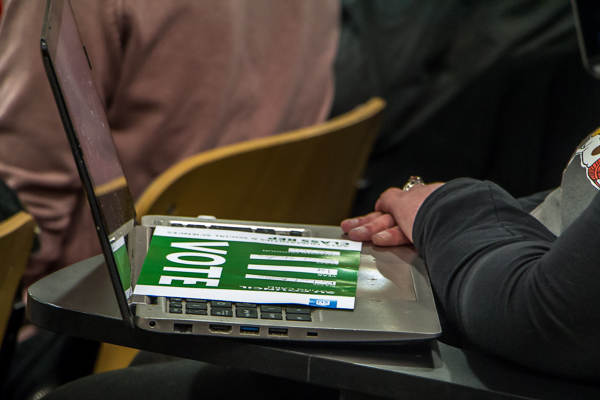Trinity College Dublin Students’ Union (TCDSU) is to introduce an intern for sexual consent education and development, funded using up to €60,000 provided by the Higher Education Authority, after a motion proposing the move was passed at council tonight.
The motion was proposed by TCDSU Welfare Officer James Cunningham, and seconded by Gender Equality Officer Aoife Grimes.
Speaking at council, Cunningham told those assembled: “It’s imperative that we make a centralised position as soon as possible.”
The intern will work with the College’s Counselling Service, which provides consent workshops to students in Trinity Hall, along with society groups.
Prof Trish Murphy, from the College Counselling Service, also addressed council. She said that an intern working in this area could lead to “a much bigger voice in a public platform”.
Speaking to The University Times, Rachel Skelly, a member of TCDSU’s consent steering committee, said: “The consent workshops have been a huge part of student life over the past three years and they have helped a lot of students, and it’s brought consent into the vernacular of the college community.”
Skelly said the position needs to be full time in order to expand the content and “make it as relevant as possible and give students as much opportunity to participate”.
TCDSU was one of the first students’ unions in Ireland to introduce consent workshops. These were made mandatory for Trinity Hall residents in September 2016. In 2017, the workshops saw an attendance rate of over 90 per cent.
Last year, Trinity approved a €15,000 expansion of consent workshops, committing to cover the costs of the project. Speaking to The University Times at the time, TCDSU Welfare Officer Damien McLean said he was “delighted” with the decision.
“Myself and the Student Counselling Service understand how important they are”, he said. “We’re delighted to see their value being recognised in College.”
Earlier this month, the union released a 12-page document providing guidelines for reporting sexual assault and rape in College.
The approach of universities to issues of sexual misconduct has come under increasing scrutiny in recent years. Last week, University College Dublin’s (UCD) School of Computer Science was forced to apologise for forwarding an email from a medicine student that asked computer science students to help develop a consent app, which would allow users to electronically sign a contract before sex to “fights[sic] the ever growing fear for men to be sued post intercourse”.
At the time, in an email statement to The University Times, UCD Students’ Union (UCDSU) President Barry Murphy said that the union was “appalled at the content of the message sent to our students”.
Last month, TheJournal.ie revealed that 10 allegations of sexual harassment, sexual assault and inappropriate behaviour have been made against staff members in Irish universities since 2015.
Trinity refused TheJournal.ie’s request for information on sexual misconduct investigations, arguing “that the public interest in the right of access does not outweigh the public interest in upholding the privacy of the individual(s) concerned”.
Trinity did confirm, however, that there were no ongoing investigations of sexual misconduct by staff members against students.
Research conducted last year by NUI Galway revealed that 70 per cent of women and 40 per cent of men have experienced sexual harassment in college. A report from the Cork Sexual Violence Centre also reported that three students in University College Cork (UCC) had been raped during the first week of teaching term.
A government meeting, headed by Minister for Higher Education Mary Mitchell O’Connor, was held in October 2018 to tackle sexual assault on campuses across Ireland.
In response to these figures, more and more students’ unions have begun to organise consent workshops. Early attempts at implementing such workshops had mixed results, with UCDSU being forced to cancel its workshops in 2017 due to low attendance.







